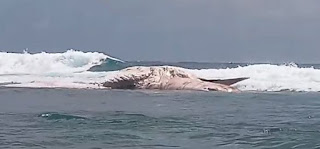"Die Einwohner von Rivière Banane in Rodrigues wurden an diesem Sonntagmorgen, dem 20. Februar, Zeugen einer ungewöhnlichen Szene, nachdem ein Pottwal entdeckt wurde, der an den Strand gespült wurde. Nach unseren Informationen waren es lokale Fischer, die diese Entdeckung etwas früher machten und nachsehen wollten, ob das Säugetier noch lebt, aber leider ... Die Behörden wurden zum Tatort gerufen und sind noch vor Ort, um Proben zu entnehmen, die anschließend analysiert werden. Durch diese Proben können die genauen Ursachen ermittelt werden, die zum Tod des Wals geführt haben."-
"The inhabitants of Rivière Banane in Rodrigues witnessed an unusual scene on this morning of Sunday February 20 after the discovery of a sperm whale which washed up on the beach. According to our information, it was local fishermen who, a little earlier, made this discovery and went to check if the mammal was still alive, but alas... The authorities have been summoned to the scene and are still on site to take samples which will then be analyzed. Through these samples it can be determined the exact causes that caused the death of the cetacean." -
"Les habitants de Rivière Banane à Rodrigues ont assisté à une scène peu commune en ce matin du dimanche 20 février après la découverte d’un cachalot qui s’est échoué sur la plage.
Selon nos informations, ce sont des pêcheurs de la localité qui, un peu plus tôt, ont fait cette découverte et sont allés vérifier si le mammifère était toujours en vie, mais hélas…
Les autorités ont été mandées sur les lieux et sont toujours sur place pour effectuer des prélèvements qui seront par la suite analysés. À travers ces échantillons, l’on pourra déterminer les causes exactes ayant provoqué la mort du cétacé."







































